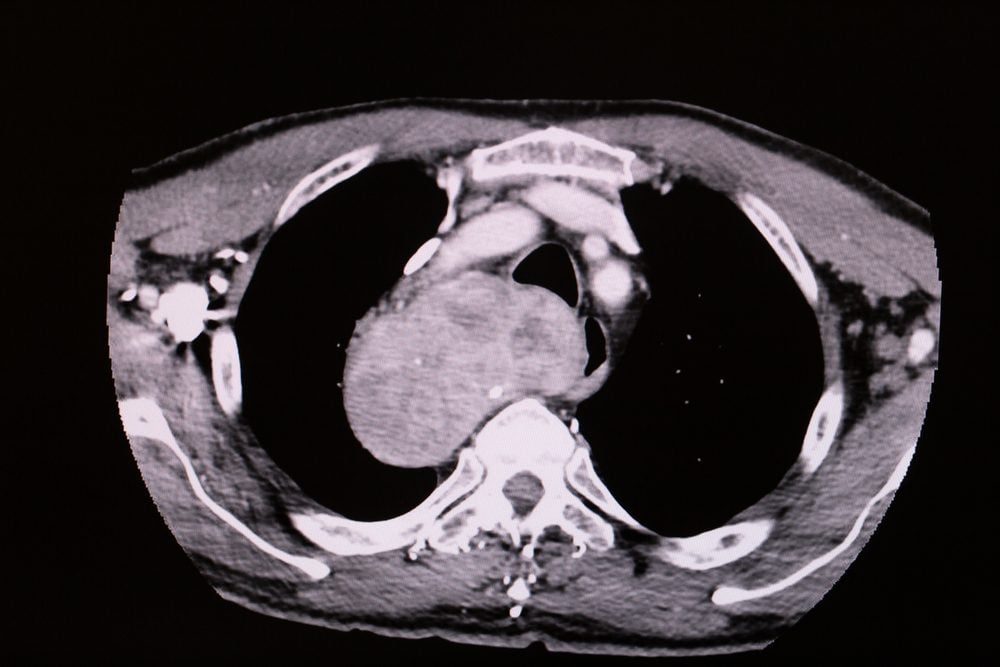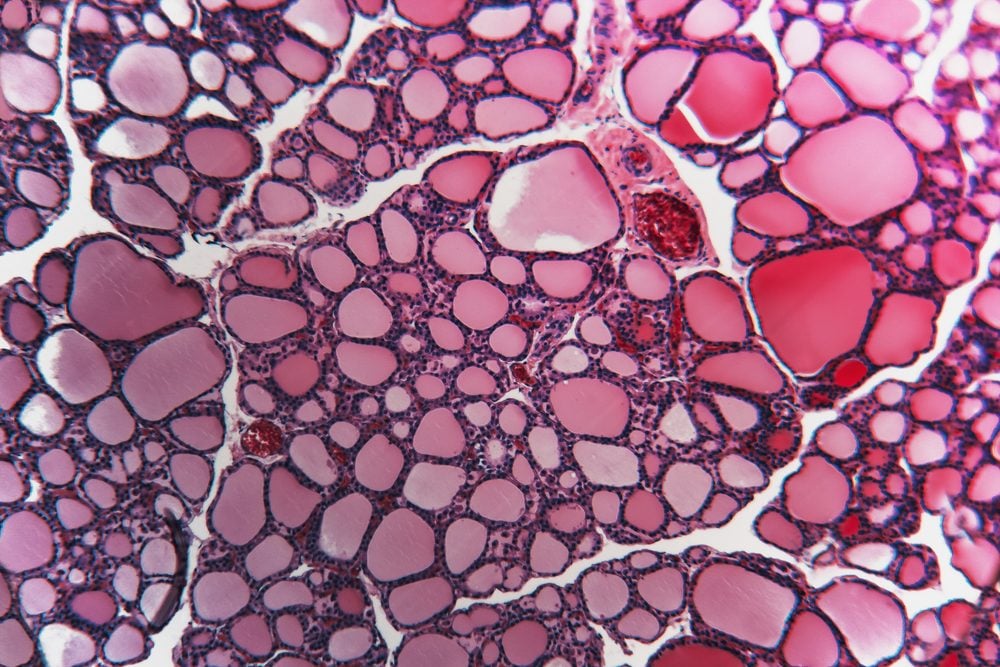
Small package, big trouble
For such a small organ, the thyroid—that butterfly-shaped gland located in the front of your neck above your collarbone—wields a lot of power. It directly or indirectly controls virtually every function in the body. Here’s what you need to know.

What your thyroid does
The thyroid makes the hormones known as T4 and T3, which are used by all the cells of the body. “These hormones are essential for life,” says Terry Davies, MD, co-director of the Thyroid Center at Mount Sinai Union Square in New York. “When there is too much of them or too little then things can go seriously wrong.” Too much thyroid hormone, for example, can aggravate the heart, causing palpitations and anxiety. Too little can cause weight gain; and “because the brain is very thyroid dependent,” says Dr. Davies, too little thyroid hormone can also cause depression.
Here are the signs you could have high-functioning depression.

Thyroid issues can affect your overall health
With great power comes great responsibility, and the thyroid is no exception. Unfortunately, there are many ways in which this gland can be thrown off, and there are a number of conditions that fall under the category of thyroid disease. The big ones are hypothyroidism (an underactive thyroid gland), hyperthyroidism (an overactive thyroid gland), Hashimoto’s (an autoimmune disorder that attacks the thyroid, causing hypothyroidism), and Graves’ disease (an autoimmune disorder that causes hyperthyroidism). “In addition, the thyroid may form growths or even thyroid cancer,” says Dr. Davies.
Make sure you watch out for these thyroid symptoms.

Getting your thyroid checked is easy to do
Whether as part of your annual physical or something you schedule because you’re concerned that something is off, bloodwork can reveal troubles with your thyroid. Initially, “an excellent and sensitive blood test called TSH (thyroid-stimulating hormone) can diagnose abnormal thyroid function very easily,” says Dr. Davies. “TSH is the messenger hormone from the brain to the thyroid gland telling it to work harder. When the thyroid fails, the message gets louder so TSH is increased. When the thyroid is overworking the brain does not need to send messages so TSH is low.” If your TSH test results are not normal, you will need at least one other blood test—T4, T3, or thyroid antibody tests—to help find the cause of the problem.
These are the diseases doctors are most likely to miss.

Thyroid conditions can arise at any age
A study published in the Journal of Clinical & Diagnostic Research found that there are a number of myths about thyroid disease. For instance: almost 40 per cent of study participants thought obese people are more likely to get hypothyroidism; about 27 per cent believed elderly people are more affected, and around 13 per cent believed women get more affected with hypothyroidism. Only nine per cent were aware that hypothyroidism can affect all age groups.
Follow these simple tips to boost your metabolism.

Hyperthyroidism symptoms are varied
When your thyroid is producing too much thyroid hormone, it can result in hyperthyroidism. Christian Nasr, MD, medical director of the Thyroid Center at Cleveland Clinic in Cleveland, Ohio, describes this as feeling like you’re going 100 kilometres per hour all the time. Hyperthyroid symptoms include anxiety, nervousness, irritability, increased sweating, difficulty sleeping, thinning of your skin, fine brittle hair, and muscle weakness.
Don’t miss these other sneaky reasons your hair is falling out.

Hypothyroidism affects energy levels and more
On the opposite end of the spectrum, hypothyroidism is when your thyroid is underactive. “Imagine moving slowly all the time,” says Dr. Nasr. Other symptoms include “feeling tired and sleepy, bloated and constipated, cold all the time, and experiencing hair and nail changes, mental slowness, and a slow heart rate.”
Here are more medical reasons you’re tired all the time.

Your quality of life can suffer
Without proper treatment, the most severe forms of hypothyroidism and hyperthyroidism can be life-threatening, says Dr. Nasr. But even milder issues can interfere with your daily life. “People who have an underactive thyroid that is left untreated may lack energy and mental alertness,” he says, noting that this can be particularly problematic at work. “Women with either hypothyroidism or hyperthyroidism can experience infertility.”

Finding balance is key
If you’re diagnosed with hypothyroidism, your doctor will likely prescribe medicine to promote hormonal balance. “There is no other treatment needed for a low thyroid,” says Dr. Davies, adding that “no dietary changes make a difference. Some people do just fine with levothyroxine (T4), while a small number of people seem to do better with a mixture of T4 and T3.”
Learn to spot the signs you might have a hormone imbalance.

You are what you eat
Despite all the hype, there is limited science to back up a so-called “thyroid diet,” says Dr. Davies. One study published in the Journal of Medical Nutrition and Nutraceuticals, suggests that micronutrients such as iodine, selenium, and zinc play an important role in thyroid health. But the researchers conclude that the best advice for patients is to consume a healthy balanced diet, and meet the daily iodine requirement.
Find out all of the ways salt is making you sick.

Selenium is essential to thyroid function
Selenium is key because the thyroid is the organ with the highest amount of selenium per gram of tissue. This micronutrient helps defend against disease, and it also supports the metabolism of thyroid hormones. Foods rich in selenium include Brazil nuts, yellowfin tuna, halibut, sardines, ham, canned shrimp, turkey, and liver.

Approaches to thyroid cancer are changing
Thyroid cancer diagnoses have tripled in the past three decades, though much of that dramatic rise may have to do with the increased use of thyroid ultrasound, which can detect small thyroid growths they may have been overlooked in the past. A study published in JAMA Otolaryngology: Head & Neck Surgery found that new approaches are needed to avoid over-treating slow-to-develop tumours that would otherwise remain asymptomatic. Doctors are now trying less intensive treatments, meaning that not every patient will be told he or she needs to have the entire gland removed. Small tumors may receive a watch-and-wait approach, with monitoring to see if the tumor will become larger to determine if surgery is necessary.
Read about the thyroid cancer symptoms you should never ignore.

Thyroid cancer diagnoses appear to be surging
According to Thyroid Cancer Canada, thyroid cancer is now the number one cancer among people aged 15 to 29 years-old in Canada. Why this particular cancer? More studies need to be done, but Dr. Nasr attributes much of the rise to the most common type, which is papillary cancer. “Most of the increase is due to finding small thyroid nodules incidentally on imaging,” he says.

Screening for thyroid nodules isn’t always recommended
We’re fortunate enough to live in a time with many different methods of imaging, like CT scans and ultrasound. But that’s where the risk of overdiagnosing lies, since, as Dr. Nasr has noted, doctors are finding more small nodules (growths). “Once a nodule is found, it needs to be addressed, which may require a biopsy,” he says.
Don’t dismiss these important symptoms that could signal huge health problems.